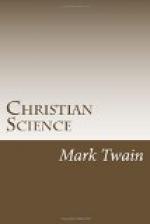Something more than a generation ago Mrs. Eddy went out with her flint-lock on the rabbit range; and this was a part of the result:
“After his decease, and a severe casualty deemed fatal by skilful physicians, we discovered that the Principle of all healing and the law that governs it is God, a divine Principle, and a spiritual not material law, and regained health.”—Preface to Science and Health, first revision, 1883.
N.B. Not from the book itself; from the Preface.
You will notice the awkwardness of that English. If you should carry that paragraph up to the Supreme Court of the United States in order to find out for good and all whether the fatal casualty happened to the dead man—as the paragraph almost asserts—or to some person or persons not even hinted at in the paragraph, the Supreme Court would be obliged to say that the evidence established nothing with certainty except that there had been a casualty—victim not known.
The context thinks it explains who the victim was, but it does nothing of the kind. It furnishes some guessing-material of a sort which enables you to infer that it was “we” that suffered the mentioned injury, but if you should carry the language to a court you would not be able to prove that it necessarily meant that. “We” are Mrs. Eddy; a funny little affectation. She replaced it later with the more dignified third person.
The quoted paragraph is from Mrs. Eddy’s preface to the first revision of Science and Health (1883). Sixty-four pages further along—in the body of the book (the elephant-range), she went out with that same flint-lock and got this following result. Its English is very nearly as straight and clean and competent as is the English of the latest revision of Science and Health after the gun has been improved from smooth-bore musket up to globe-sighted, long distance rifle:
“Man controlled by his Maker has no physical suffering. His body is harmonious, his days are multiplying instead of diminishing, he is journeying towards Life instead of death, and bringing out the new man and crucifying the old affections, cutting them off in every material direction until he learns the utter supremacy of Spirit and yields obedience thereto.”
In the latest revision of Science and Health (1902), the perfected gun furnishes the following. The English is clean, compact, dignified, almost perfect. But it is observable that it is not prominently better than it is in the above paragraph, which was a product of the primitive flint-lock:
“How unreasonable is the belief that we are wearing out life and hastening to death, and at the same time we are communing with immortality? If the departed are in rapport with mortality, or matter, they are not spiritual, but must still be mortal, sinful, suffering, and dying. Then wherefore look to them—even were communication possible —for proofs of immortality and accept them as oracles?”—Edition of 1902, page 78.




